Liverpool city mayoral elections: Three women seek Labour nod
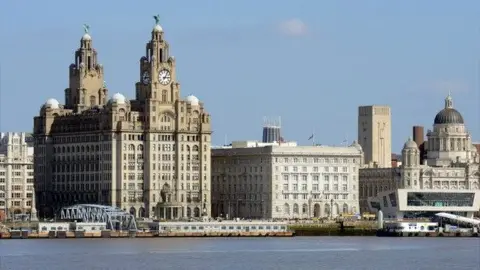 Getty Images
Getty ImagesLiverpool should have a new directly elected city mayor in May, whichever party wins.
Assuming Covid-19 doesn't get in the way again and force another postponement, we know that Labour's candidate replacing Joe Anderson on the ballot paper will be a woman, picked from a shortlist of three city councillors.
Labour has been criticised in the past for the lack of female leaders in local government, and now Liverpool members have a choice between three women with very different styles.
Confusingly though, in a region which is often accused of having a surplus of mayors, they all have mayoral connections.
Wendy Simon is currently acting mayor, Ann O'Byrne is a former deputy mayor, and Anna Rothery is the current Lord mayor.
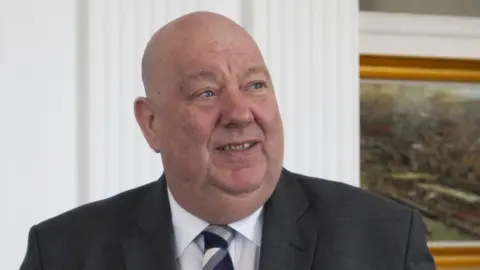 Getty Images
Getty ImagesMr Anderson, who first took office in 2012 after serving as council leader, was administratively suspended from the Labour Party following his arrest in December on suspicion of conspiracy to commit bribery and witness intimidation.
He'd already been selected as Labour's candidate, and would have sought a third term in office last May had it not been for the Covid-19 pandemic resulting in the shelving of local elections.
When Mr Anderson's bail was extended to 19 February, he said it was "is in the best interests of the Labour Party to select a new candidate".
In his New Year's Eve statement he added: "It has been a great privilege to represent the Labour Party and be part of a collective movement that represents people like me growing up in, and trying to find a way out of, poverty.
"Whoever the new Labour mayoral candidate is, I will cheer them on with all my heart."
He said he hoped to clear his name as soon as possible.
Mr Anderson's departure really is the end of an era for the city, though; he has dominated the political scene for a decade.
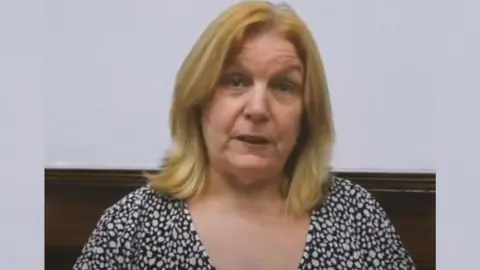 Liverpool City Council
Liverpool City CouncilWendy Simon, who has been acting mayor since Mr Anderson stepped aside in December, is often described as a "safe pair of hands" - she's even using that phrase as a hashtag in her campaign.
She is also the cabinet member for culture and tourism, overseeing large scale events like the Giants, as well as dealing with more prosaic issues like finding millions of pounds to fix crumbling swimming pools.
Described as quiet and collegiate by people I've spoken to, many have been surprised and impressed by her ambition and zest for running the city in the past few weeks.
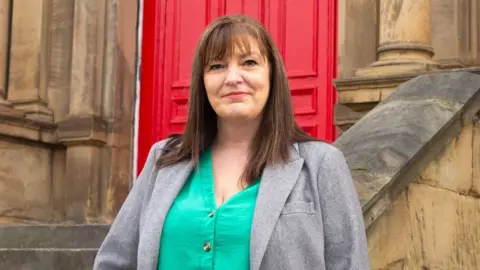 Ann O'Byrne
Ann O'ByrneFormer deputy mayor Ann O'Byrne dramatically quit Mr Anderson's cabinet in 2018, accusing him of "not listening" to colleagues.
She has previously said she believes a council leader and cabinet model is a more inclusive way of running a city than having a directly elected mayor, something she's described as "boss politics".
A familiar face on picket lines and at protests, she's banking on grassroots support from the left of the party.
As mayor of Liverpool, she said she would hold a binding referendum on governance styles in 2023 - and support the scrapping of the mayoral model.
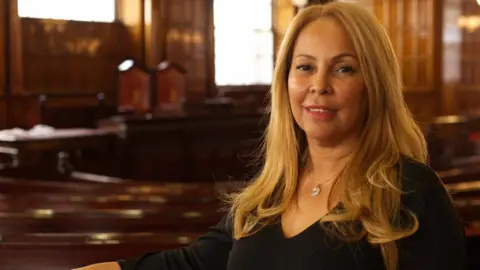 Liverpool City Council
Liverpool City CouncilIn 2019, Anna Rothery made history by becoming the first black Lord Mayor of Liverpool.
When reappointed for a second term last year, she spoke out against racism amid the Black Lives Matter movement.
She says Liverpool "needs a clean break and a shake-up".
As the only one of the three candidates not to have served in an Anderson cabinet, she can certainly be seen as the new broom.
The flipside is that the others may point to her lack of top-level experience.

Mayor or no mayor?
Directly elected mayors are a bit like presidents. Directly elected every four years, they enjoy a personal mandate and don't have to belong to any political party or even already be a councillor. They can still appoint a cabinet of senior councillors with different areas of expertise and responsibility, but ultimately the buck stops with them.
A council leader and cabinet model is more familiar in the UK and can be seen as a localised version of what goes on at Westminster. The leader of the largest party usually becomes council leader and that person is elected by their peers. So just as the public don't directly choose their prime minister, neither do they select their council leader. A cabinet of senior councillors support the leader.

At least two of the other parties in the race would scrap the role of elected city mayor.
Liberal Democrat candidate Richard Kemp and his Green Party rival Tom Crone both believe the role concentrates too much power in one person.
The Lib Dems have twice attempted to force a full council vote on getting rid of the position, but with Labour dominating the council with 72 of the city's 90 seats, it's unlikely change will happen without Labour support.
The Conservatives have not yet selected their candidate.
Also standing in the election is Roger Bannister from the Trade Union and Socialist Coalition.

Why not follow BBC North West on Facebook, Twitter and Instagram? You can also send story ideas to [email protected]
